America’s three newest recipients of the Medal of Honor have different stories from different times in service, but there are a few things all three share: A relentless focus on the mission, an undying loyalty to the soldiers they served with, and an unhesitating willingness to sacrifice themselves for others.
Army Master Sgt. Earl Plumlee received the Medal of Honor on Thursday alongside family members of Sgts. 1st Class Alwyn Cashe and Christopher Celiz, who were posthumously awarded the nation’s highest military honor. Cashe is the first Black service member to be awarded the Medal of Honor since Sept. 11, 2001.
“Today we honor three outstanding soldiers whose actions embody the highest ideals of selfless service,” President Joe Biden said on Thursday. “We also remember the high price our military members and their families are willing to pay on behalf of our nation. And remember the strength and the sacrifices of these military families, caregivers, and survivors. And we remember and renew our sacred obligation to those who serve this nation in uniform.
“As a nation we have many obligations … but we have only one truly sacred obligation: that’s to properly prepare and equip those troops we send into harm’s way, care for them and their families, both while they’re deployed and when they return. That commitment never expires.”
The stories of America’s three newest Medal of Honor recipients can be read below.
‘Damn boys, we’re in a tight spot’
Katie Celiz met her husband Christopher Celiz in 2002, when they were in high school and working at the same grocery store. One week she noticed that every time she hung her jacket up after getting to work, it would be missing by the time she went to get it to leave. It went on for a week before one day she saw Chris wearing it while he was pushing shopping carts in from the parking lot.
“He saw me see him,” Katie Celiz said.. “The next day when I went to get my jacket, it was finally there. And inside the coat pockets were rose petals. And the next day was when he actually asked to start hanging out and stuff. We really hit it off, and we’ve been together ever since.”
Chris, like many soldiers of his generation, knew he wanted to join the military after Sept. 11, 2001. He wanted “to make a difference,” Katie said. He enlisted in the Army in September 2006 as a combat engineer, and married his high school sweetheart a year later. She said that they have a daughter who is now 11 years old and that they had a “beautiful life.” Chris was “an amazing man, amazing father.,” she said, who “brought joy to everybody’s lives that he touched.”
He deployed to Iraq in 2008 and 2009 and to Afghanistan in 2011 and 2012. Then in 2013, Chris was selected to serve with the elite 75th Ranger Regiment and was assigned to the regiment’s Headquarters Company, 1st Battalion, at Hunter Army Airfield, Georgia.
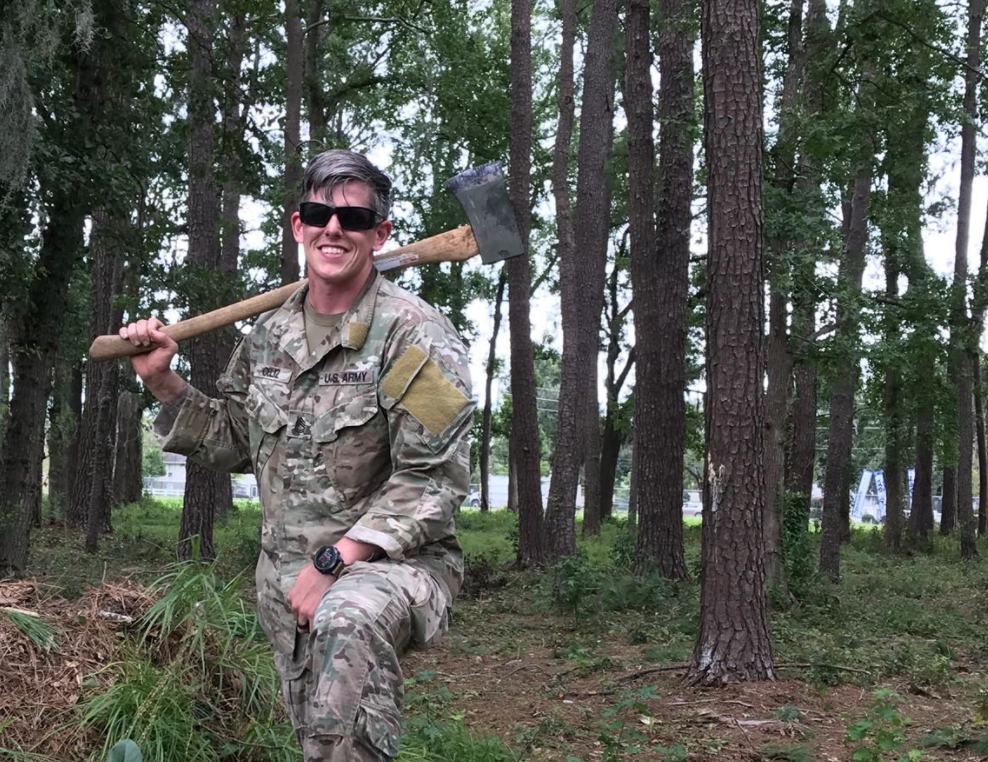
2nd Lt. David White, a former enlisted soldier who served with Chris in the 75th Ranger Regiment, met him in January 2018. He was a corporal new to the battalion, who was preparing for a deployment to Afghanistan.
It was White’s first deployment ever; but it was Chris’ fifth with the Rangers. Chris had a way of “making us feel like family,” White said. He was patient, he never excluded anyone, and he always found things “to bring us together in our down time.” He was a great guitar player, White said, but he was also a solid leader who trained the soldiers hard and ensured they were up to standard.
On July 12, 2018, the battalion was tasked with clearing enemy forces from an area in Afghanistan’s Paktia Province. Chris was leading the mission that day, in charge of his soldiers and other partner forces working alongside 1st Battalion. They got to the area they were expected to clear at around 4 a.m. when they began “running into enemy scouts,” White said. A small gun fight broke out which the Rangers quickly handled.
“Chris looked at us in the vehicle, the rest of our team, and said, ‘It’s going to be a good day,’” White recalled. “He was very calm, very focused, you know? He was glad to be conducting a mission as a U.S. Army Ranger.”
As the operation continued and the sun began to rise, the Rangers started assessing what to do next: they were “in the enemy’s backyard,” White said, and in the middle of open terrain. It was a “pretty good spot” for the enemy to attack them, and that is exactly what happened.
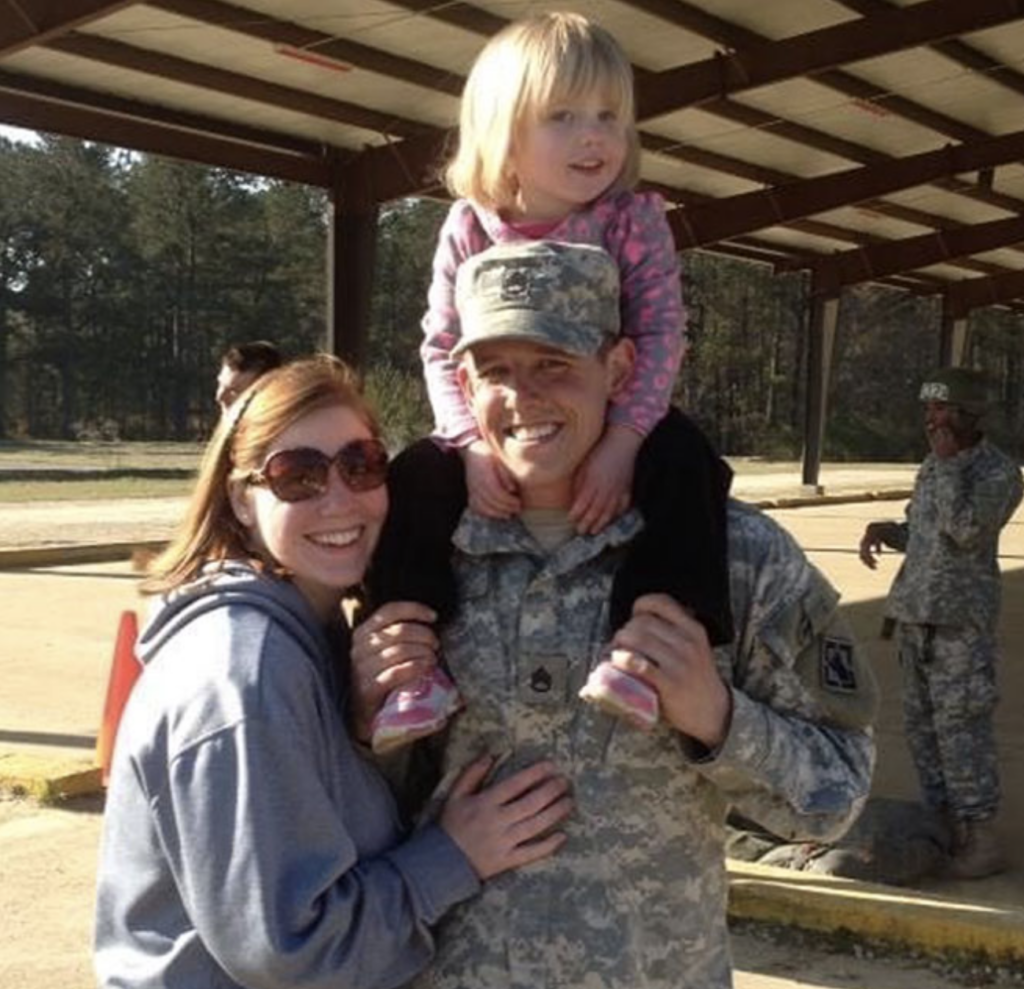
A large enemy force attacked the soldiers and partner forces, Chris’ Medal of Honor citation says. While they initially began attacking the Rangers from the north, they realized it was just to draw their attention away from a larger attack. They started “getting hit hard,” White said, hard enough that they were being pinned down and unable to counterattack.
In the midst of the battle, Chris came running around to cover where his soldiers were. As they soldiers were pinned down by the enemy, White said Chris quoted a line from O Brother, Where Art Thou?: “He says, ‘Damn boys, we’re in a tight spot.’”
“That’s just a testament to his character, in the midst of all that gunfire and the threat to our lives, he’s cracking a joke to lighten the mood, so we stay focused and don’t get overcome by fear or anxiety,” White said. “We’re just as calm as he is and we’re feeding off his energy.”
During the initial attack, a partner force member was critically wounded, but unable to get themselves back behind cover. Chris began engaging the enemy, allowing his team time to retrieve the wounded partner member and bring them back behind cover. After waiting almost half an hour before the enemy fire subsided, the Rangers were confident enough to call in a helicopter to evacuate the injured casualty out of the area. But the helicopter was going to land in the open, which put it at risk of enemy fire.
As soon as the helicopter landed, the enemy opened up “with all they had,” White said. It looked “like the ground was boiling from the amount of rounds hitting the dust.” And as the soldiers worked to evacuate the partner force member, Chris charged ahead and used himself as a human shield, putting himself between the guys carrying the wounded soldier to the helicopter, and the enemy. He returned fire on the insurgents, standing between them and the helicopter, to “act as a physical shield to the aircraft and its crew,” the citation says.
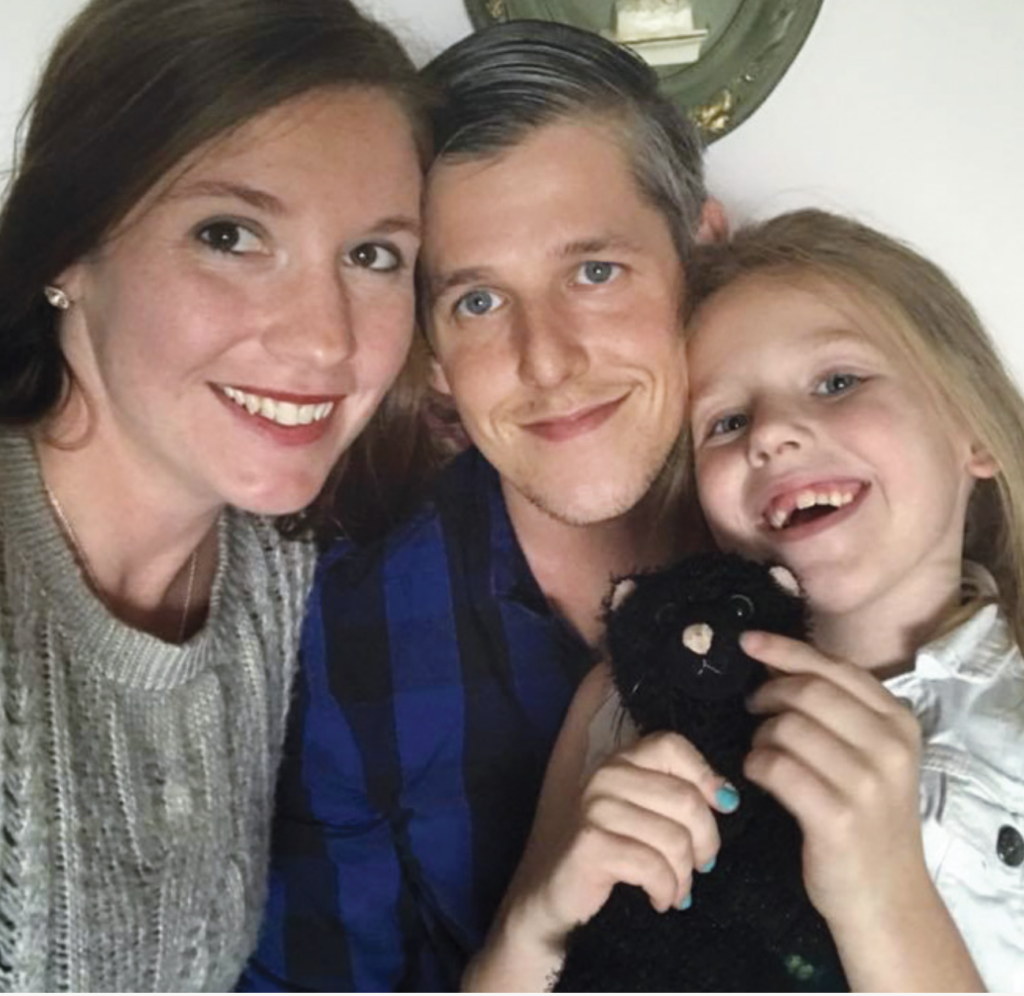
Chris positioned himself between the enemy and the cockpit to protect the pilot before taking off, but he was shot. White, who was still on the ground, recalled seeing Chris moving away from the helicopter as it took off and towards the cover of their vehicles. He saw him get shot but thought it was in his leg — “I had a quick thought like, ‘Okay, he’s been shot in the leg, he’ll live.’” But then he saw Chris collapse.
“He looks up at the helicopter as he’s collapsing onto his hands and knees, and I see him take his hand as he’s looking up, and wave them off: ‘Don’t come back for me,’” White said. “We talked to the helicopter crew afterwards. He made eye contact with one of the crew members who saw him going down, he was like ‘No, get out of here.’ And then he collapsed.”
He was unconscious, and the other soldiers brought him to safety. The same helicopter circled back around and was able to evacuate Chris, but he ultimately died from his wounds.
Katie said while she is still “a little angry” at her husband for waving off the helicopter to leave him behind, though she’s not surprised why he did it.
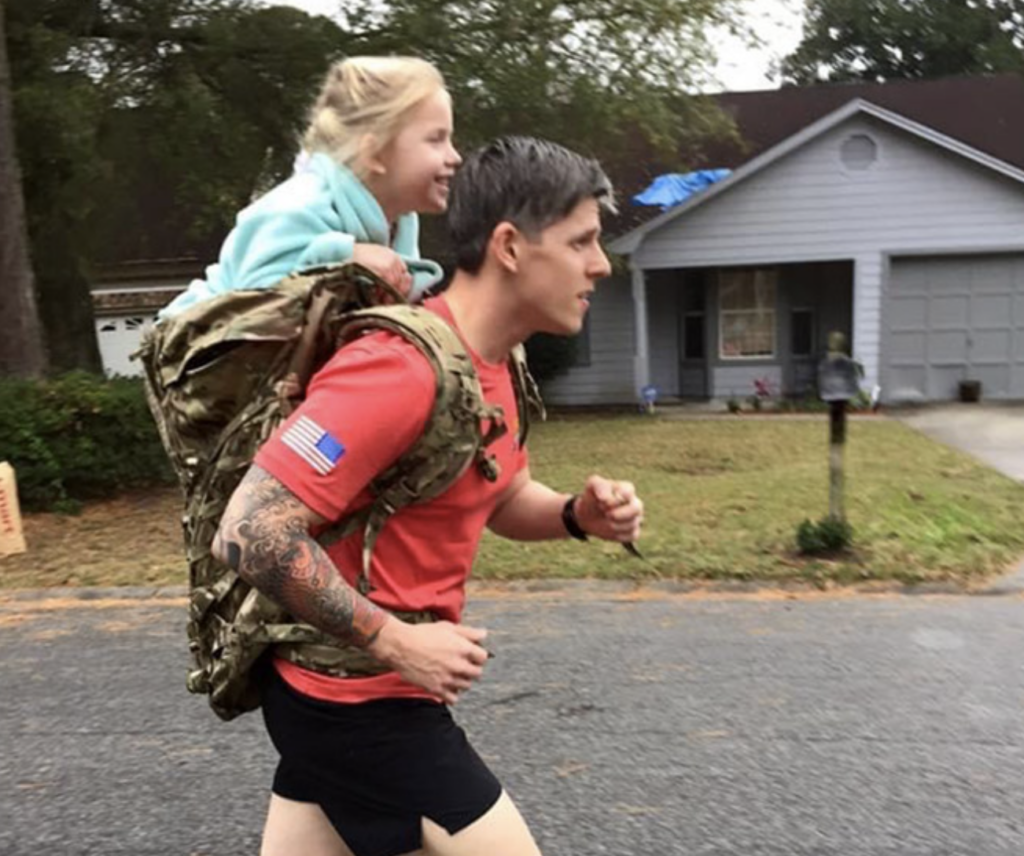
“Chris really believed that being there for his men and protecting his men was everything,” she said. When she got the call telling her that her husband was receiving the Medal of Honor, she was shocked. She didn’t even realize he had been recommended for the award, and at first, she and her daughter weren’t sure it was real.
Frankly, it still doesn’t seem real. She’s proud of her husband, and humbled to know that there “are people out there that see my husband as a hero,” something she always believed herself.
“It’s overwhelming to think of how selfless he could be sometimes,” she said. “I think that’s one of the reasons why I get so angry, because he didn’t think about how his actions sometimes could affect himself. For him it was never about himself. It was always about his men, his country, and our family.”
‘He got them back and made sure every single one of those kids got to say goodbye’
In October 2005, Sgt. 1st Class Alwyn Cashe was on his second deployment to Iraq, serving as the platoon sergeant of 1st Platoon, Alpha Company, 1st Battalion, 15th Infantry Regiment, 3rd Infantry Division.
He was conducting a route clearance patrol with his soldiers when his Bradley Fighting Vehicle struck an improvised explosive device. The explosion ruptured the vehicle’s fuel cell and immediately caused the Bradley to ignite in flames. While there are many parts of his story that his soldiers recall, the primary theme that almost everyone points to is how Cashe repeatedly put his soldiers before himself. Time and time again, whether he he was pulling his soldiers from the fiery wreckage, going with them to receive medical care, or receiving his own medical treatment in a hospital in Texas, Cashe put his soldiers first.
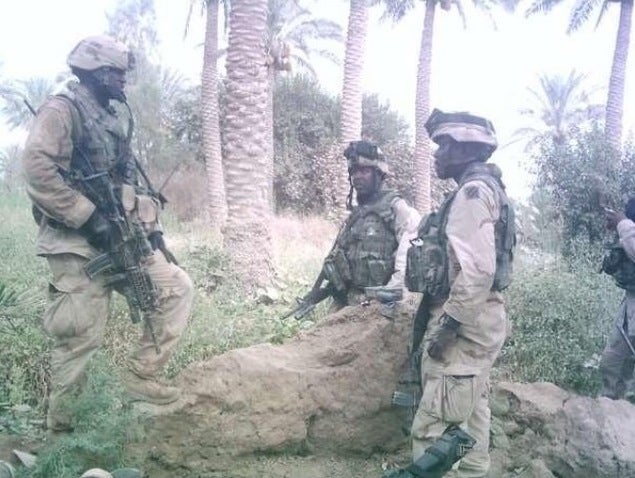
His sister, Kasinal Cashe White, has been advocating alongside other soldiers and supporters for her brother to receive the Medal of Honor for more than a decade. And while she said she is proud of her brother, she and her family would give the medal back in a second if it meant they could have him back instead.
“This is great, this is the highest honor that our nation can give to a person that has done anything,” Cashe White said on Wednesday. “But I’d trade it all to erase Oct. 17, 2005. I’d trade it all.”
That day in 2005, 1st Platoon was tasked with a route clearance patrol ahead of a convoy that was expected to come through the area the next day, bringing supplies and fuel to Forward Operating Base Mackenzie. That night, the weather was terrible — there was a dust storm that had made conditions extremely difficult. Col. Jimmy Hathaway, a captain who commanded Alpha Company at the time, said Wednesday that it was what they called “Red Air,” meaning aircraft would have trouble flying.
Hathaway sat down with Cashe and 2nd Lt. Leon Matthias to discuss their options trying to figure out if the platoon should still go out that night.
“Cashe just stands up and says, ‘No, we’ve got to go. We’ve got to protect them. We’ve got to make sure they can get in, we need the supplies, but it’s our job to protect those guys coming up to bring us those supplies. We have to be there,’” Hathaway recalled.
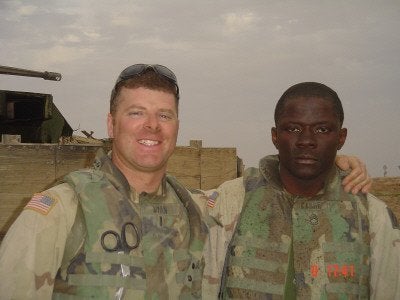
That dedication to protecting others is a common thread that runs through Cashe’s story, demonstrated again and again during that mission.
After the lead vehicle in the patrol — Cashe’s Bradley — struck the IED and burst into flames, he was originally only slightly injured, but he was quickly soaked in fuel. Nonetheless, Cashe went back to the vehicle again, and again, and again, pulling his soldiers out one by one. Even as flames spread across his fuel-soaked uniform, Cashe never stopped. Not even when burns covered more than 70% of his body. Not even as the platoon took small-arms fire. He simply refused to quit until all of his soldiers were accounted for.
By the time a medical evacuation helicopter had arrived to get the soldiers to medical care, Cashe was the most severely injured. Still, Hathaway said Cashe refused to get on the helo until his soldiers had been loaded on.
“My first sergeant was trying to get Cashe in the CASEVAC, and put onto the stretcher — because he’s burned over 72 percent of his body at this point in time — he refused,” Hathaway said. “I watched him, it took my first sergeant, with some special words, we’ll say, to encourage him to get on now. He was refusing to get into the vehicle until all his boys were on and everybody was accounted for and everybody was set.”
Once Cashe was finally convinced to board the aircraft, he refused to be loaded onto a stretcher. He wanted to walk off the battlefield.
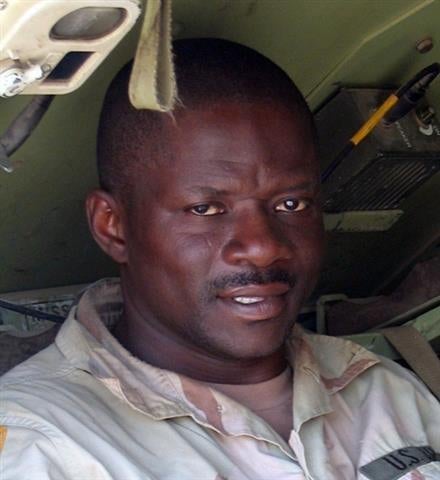
Retired Sgt. 1st Class Douglas Dodge recalled in a video posted by the 3rd Infantry Division that as the wounded soldiers were transported to Balad Air Base, he could hear Cashe yelling, “‘how are my guys? What’s going on with them? Where are they at?’ Kind of refusing, almost, treatment until he knew that we were all being taken care of.”
The soldiers were ultimately taken to the Brooke Army Medical Center in San Antonio, Texas. Cashe’s sister, Kasinal Cashe White, has said the first thing that her brother asked when he regained consciousness was: “How are my boys?”
By his actions that day, not only did Cashe get his soldiers out of the back of the burning Bradley, he gave some of them an opportunity few get in war: A chance to say goodbye to their families.
“When you look at the war at that point in time, there was a lot going on. And when people who passed away overseas, they didn’t get a chance to say goodbye, their families didn’t get a chance to say goodbye. He made that happen,” Hathaway said of Cashe, his voice breaking. “He got them back. He got them back and made sure every single one of those kids got to say goodbye to their family.”
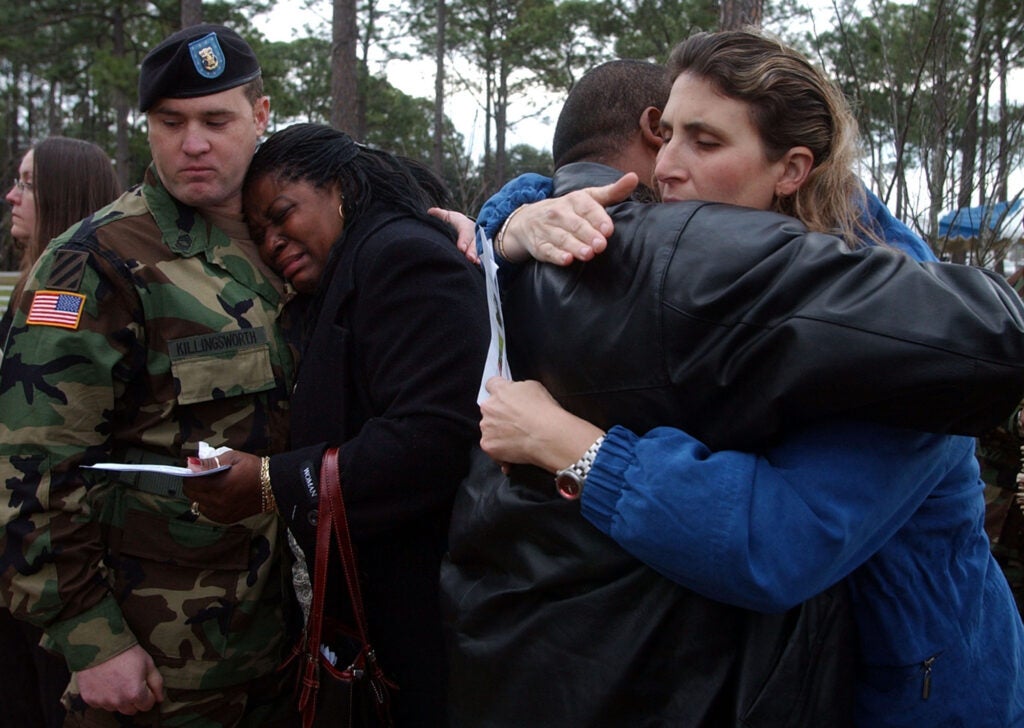
Cashe died on Nov. 8, 2005 — the last of four soldiers to die in San Antonio from the wounds they sustained that day in Iraq. Lt. Gen. Gary Brito, who was Cashe’s battalion commander in 2005, doesn’t believe that was by accident.
“I know in my heart, and I know in my soul, as the others do, that was his leadership, to ensure his boys were taken care of,” Brito said on Wednesday. “And if their final breath was their comfort, he was the last, to ensure that he took care of his soldiers.”
‘I drove all the way down there — might as well do something’
Master Sgt. Earl Plumlee was preparing for a deployment with the Army’s 1st Special Forces Group when he got a call: He was receiving the Medal of Honor.
“Everybody had questions,” he said of his teammates. “They kind of asked me not to speak about it too much, but that didn’t really work on an ODA [Operation Detachment Alpha], because we don’t really keep secrets from each other … The flight over, we cleared it out, and I literally just pretended like it didn’t happen until we got back.”
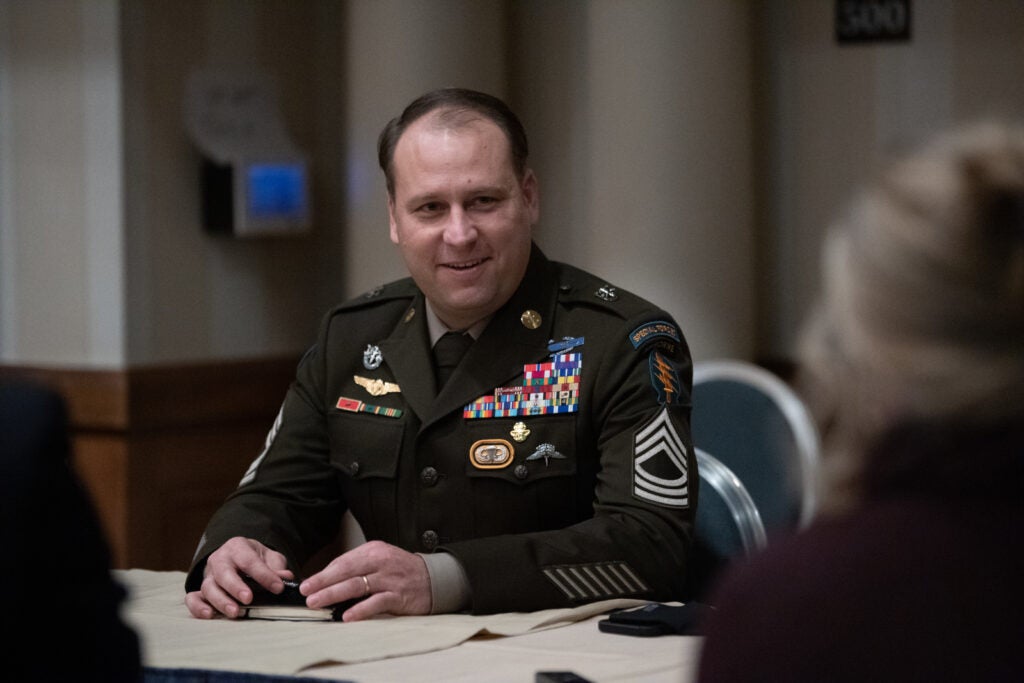
Before joining the Army in 2009, Plumlee enlisted in the Oklahoma National Guard in 1998 while still in high school, and upon graduation he joined the Marine Corps. During his Marine Corps career, he graduated Navy SERE School and the Marine’s Amphibious Reconnaissance Course. He became a team leader with Marine Recon, and in 2008 during a deployment to Iraq, he was recognized as the Marine Corps’ Recon Team Leader of the Year. A year later, in January 2009, Plumlee made a career change and joined the Army where he joined the Special Forces. He was assigned to 4th Battalion, 1st Special Forces Group.
On Aug. 28, 2013, then-Staff Sgt. Plumlee was deployed to Afghanistan when Forward Operating Base Ghazni, where he was assigned, was attacked.
A “massive explosion” at the perimeter of the base blew a 60-foot hole in the perimeter wall, his Medal of Honor citation says, clearing the way for 10 enemy insurgents wearing Afghan National Army uniforms and suicide vests.
Retired Army Sgt. Maj. Tony Bell, who was at FOB Ghazni that day, said Wednesday that when the bomb went off, everyone’s guard was down. It was a “relatively safe installation,” and it took a moment for some to realize what was happening. They began to hear pops of small arms fire after the blast, and he saw Plumlee immediately jump into a vehicle with two other soldiers and race towards the explosion.
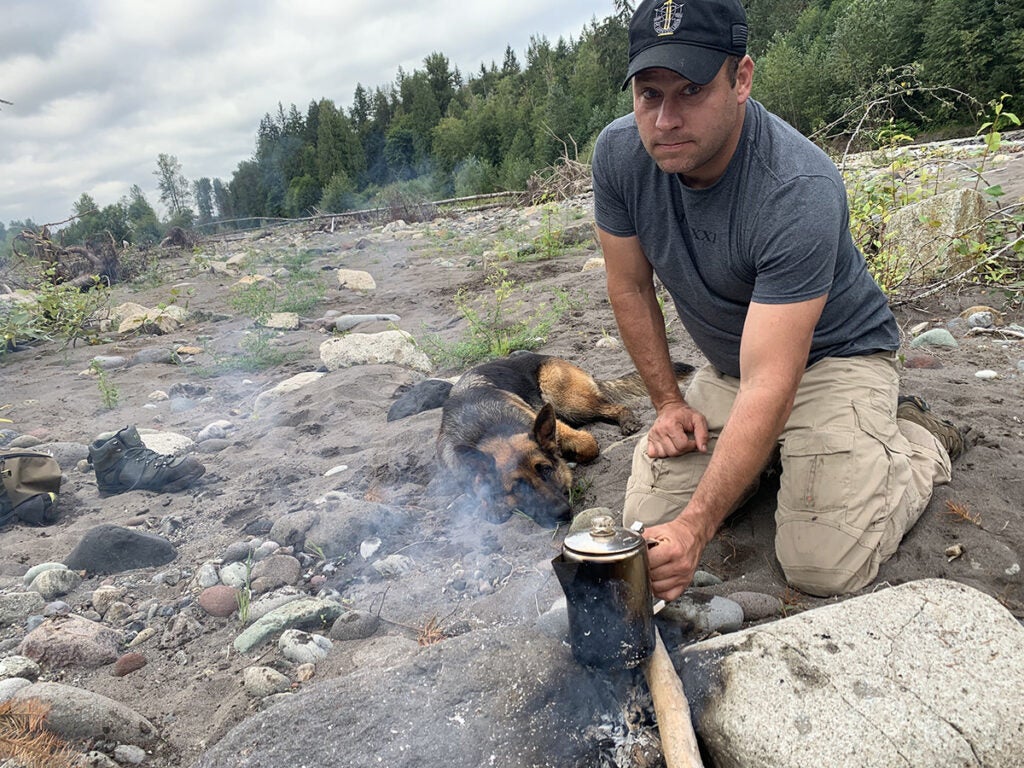
When the soldiers got to the breach point, they saw who they thought was an Afghan National Army soldier.
“They’re like hey, we need to get that guy and figure out — let’s put him to work,” Bell said. “Well, that guy decides to pull his [AK-47] up and starts engaging them in the vehicle.”
The two soldiers sitting in the front seats of the vehicle instinctually ducked, Bell said, while Plumlee, who was sitting in the back seat, jumped out of the car. His rifle got caught in the vehicle — ”Don’t imagine it as this huge epic war thing,” Plumlee said Wednesday, “it was just a cascading comedy, really” — and so he began engaging the enemy fighter with his pistol.
“Plumlee left cover and continued to advance alone,” his citation says. “Moving forward, he engaged several combatants at close range. Under intense enemy fire, Plumlee temporarily withdrew to cover, where he joined another soldier.”
Plumlee said Wednesday that during the fight and by being “blown up several times” from the suicide vests, he herniated three discs in his lower back, and one in his neck. It’s “not a traumatic injury,” he said, just “a nagging one.” But at the time, Plumlee ignored the injuries and kept moving forward.
He joined a group of U.S. and coalition forces and launched a counterattack on the insurgents. Bell said they believe now that had the insurgents had planned to detonate their suicide vests inside of the bunkers that people on the base took cover in when they came under indirect fire. Dozens of people filed into those bunkers, Bell said, and had the enemy gotten to them, it would have been devastating.
“It would have been … coalition forces, U.S. forces, contractors, I mean any number of untold people that they would have subsequently killed,” Bell said. “We would have had a catastrophic event … The enemy had bad intel, they attacked at the wrong time, in the wrong place, with the wrong people there.”
When Bell saw Plumlee right after the fire fight, he was “covered in blood” and told Bell what happened. While Plumlee was injured from the blasts of the suicide vests that detonated during the fight, he was never shot by the enemy, which he still can’t explain today. He thought he would surely die, but the way he saw it, “I drove all the way down there — might as well do something.”
“Our job is always to find them and kill them,” he said dryly. “In this case, we didn’t have to go looking for them … it was kind of helpful.”
The kind of high-profile recognition that comes from receiving Medal of Honor doesn’t really lend itself to the lifestyle Special Forces soldiers lead, and Plumlee expects he’ll be taking on a new role in the Army now. But it’s something he’s looking forward to; he was “kind of at the end of what we call the operator’s time,” he said, but he expects to find another job that is just as rewarding.
He made clear on Wednesday that while he’s extremely humbled to receive the Medal of Honor, he doesn’t consider it his. He’s simply the one receiving it on behalf of his entire team who was there that day.
“It’s representative of the Special Forces regiment, and all the operators protecting this country day in and day out,” he said. “It’s representative of the U.S. Army, the best-trained, best-equipped military fighting force the world has ever known.”
Read more on Task & Purpose
Want to write for Task & Purpose? Click here. Or check out the latest stories on our homepage.
